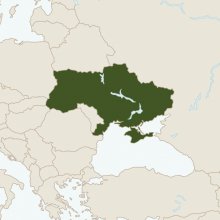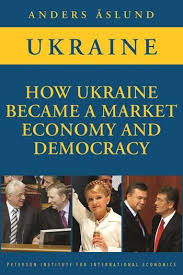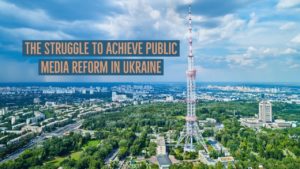
NDI
When the Ukrainian autocrat Viktor Yanukovych fled to Russia after a popular uprising in 2014, thousands of citizens poured into Mezhyhirya, his 340-acre estate on the outskirts of Kiev, writes for the New York Times:
Ordinary people, eager to see the lifestyle Yanukovych’s thievery had financed, found an opulent palace filled with chandeliers, exquisite inlaid wood and gilt. It had a private movie theater, bowling alley, golf course, dog kennel and ostrich farm. A tunnel connected the main house to a spa with an oxygen chamber and rooms devoted to different styles of massage. There was a sauna where journalists and activists dried out documents that members of the fallen regime had thrown into a lake before they departed. Astonishingly, there was little looting. Instead, Mezhyhirya was preserved as a sort of memorial to the corruption Ukrainians have endured.
“This is the big country in Eastern Europe which is trying to fight with the old demons of the past, and is partly successful,” said Nataliya Gumenyuk, the head of Hromadske,* a nonprofit television channel and multimedia news organization. “Today it’s probably a better democracy than Hungary and Poland in terms of political representation, political freedoms.”
 Ukraine is “a success case for Eastern Europe,” she adds. “If Ukraine succeeds, everybody is watching in the region — Moldovans, Belarussians, the Caucasus, Central Asia. If this country slides back to old times, or goes in the Russian direction, the region is lost.”
Ukraine is “a success case for Eastern Europe,” she adds. “If Ukraine succeeds, everybody is watching in the region — Moldovans, Belarussians, the Caucasus, Central Asia. If this country slides back to old times, or goes in the Russian direction, the region is lost.”
But there is still one problem that plagues the country – corruption.
In terms of economic growth, the Polish and Ukrainian experiences in the decades since the fall of communism have been a portrait in contrasts. Whereas Poland embraced the power of democratic civil society and grew wealthier, Ukraine remained trapped by kleptocratic institutions that bred a culture of corruption and destroyed public trust, according to Daron Acemoglu and James A. Robinson, co-authors of Why Nations Fail: The Origins of Power, Prosperity and Poverty and The Narrow Corridor: States, Societies, and the Fate of Liberty.
Ukraine (as well as Russia) received the full dose of top-down “privatization” and “market reform.” Without even a pretense of empowering civil society, the transition was predictably hijacked by oligarchs and the remnants of the KGB, they write for Project Syndicate:
 Is a society-wide mobilization still feasible in a country that has suffered under corrupt leaders and extractive institutions for as long as Ukraine has? The short answer is yes. Ukraine is home to a young, politically engaged population, as we saw in the Orange Revolution of 2004-2005 and in the Maidan Revolution of 2014. Equally important, the Ukrainian people understand that corruption must be uprooted in order to build better institutions. Their new president, Volodymyr Zelensky, campaigned on the promise of fighting corruption, and was elected in a landslide. He now must kick-start the cleanup process.
Is a society-wide mobilization still feasible in a country that has suffered under corrupt leaders and extractive institutions for as long as Ukraine has? The short answer is yes. Ukraine is home to a young, politically engaged population, as we saw in the Orange Revolution of 2004-2005 and in the Maidan Revolution of 2014. Equally important, the Ukrainian people understand that corruption must be uprooted in order to build better institutions. Their new president, Volodymyr Zelensky, campaigned on the promise of fighting corruption, and was elected in a landslide. He now must kick-start the cleanup process.
Ukraine once had a history of murderous anti-Semitism; today its new president, Volodymyr Zelensky, is a Jew, adds. As Yaroslav Trofimov pointed out in The Wall Street Journal, “One of Mr. Zelensky’s first decisions was to scrap the Independence Day tank parade on Kiev’s main avenue, instead showcasing the country’s young musicians — and a different vision of national pride.” RTWT
*Supported by the National Endowment for Democracy.







